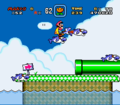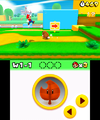Item storage: Difference between revisions
m (Actually, the name IS in the Super Mario World instruction manual. Citing reference; page 7 in said manual under the Item Stock header.) |
mNo edit summary |
||
| Line 1: | Line 1: | ||
[[File:ItemStock.png|frame|right]] | [[File:ItemStock.png|frame|right]] | ||
The '''Item Storage'''<ref>''[[Super Mario 3D World]]'' English instruction manual, p. 7</ref> (also referred to as the '''Item Reserve Box'''<ref>''[[Nintendo Power]]'' Volume 28, p. 18</ref>, or '''Item Stock'''<ref>http://www.gamesdatabase.org/Media/SYSTEM/Nintendo_SNES/manual/Formated/Super_Mario_World_-_1991_-_Nintendo.pdf</ref>) is a feature debuting in ''[[Super Mario World]]'' that allows the player to keep an additional [[List of items|item]] in reserve. If [[Super Mario]] gathers a [[Cape Feather]], for example, he will turn into [[Cape Mario]] and his former Power-Up, the [[Super Mushroom]], will move into the Item Storage. After taking damage, Cape Mario will turn into [[Small Mario]], and the reserve item will drop down automatically. The item will pass through the ground and platforms, however, and will fall off the screen if the player does not collect it fast enough. The player may also make the reserve item drop down whenever they want by pressing {{button|snes|select}}. The reserve item, when used, will not bring any extra [[Point]]s, unless it's the Cape Feather, which still brings 1000 points, though only in the SNES version. Super Mushrooms will always replace the reserve item when collected in Super, Cape, or Fire form, regardless of the Item Storage's contents. The Item Storage has reappeared mostly in handheld games (like ''[[New Super Mario Bros.]]''), although ''[[Super Mario 3D World]]'' is an exception. | The '''Item Storage'''<ref>''[[Super Mario 3D World]]'' English instruction manual, p. 7</ref> (also referred to as the '''Item Reserve Box'''<ref>''[[Nintendo Power]]'' Volume 28, p. 18</ref>, or '''Item Stock'''<ref>http://www.gamesdatabase.org/Media/SYSTEM/Nintendo_SNES/manual/Formated/Super_Mario_World_-_1991_-_Nintendo.pdf</ref>) is a feature debuting in ''[[Super Mario World]]'' that allows the player to keep an additional [[List of items|item]] in reserve. If [[Super Mario (form)|Super Mario]] gathers a [[Cape Feather]], for example, he will turn into [[Cape Mario]] and his former Power-Up, the [[Super Mushroom]], will move into the Item Storage. After taking damage, Cape Mario will turn into [[Small Mario]], and the reserve item will drop down automatically. The item will pass through the ground and platforms, however, and will fall off the screen if the player does not collect it fast enough. The player may also make the reserve item drop down whenever they want by pressing {{button|snes|select}}. The reserve item, when used, will not bring any extra [[Point]]s, unless it's the Cape Feather, which still brings 1000 points, though only in the SNES version. Super Mushrooms will always replace the reserve item when collected in Super, Cape, or Fire form, regardless of the Item Storage's contents. The Item Storage has reappeared mostly in handheld games (like ''[[New Super Mario Bros.]]''), although ''[[Super Mario 3D World]]'' is an exception. | ||
The Item Storage was reintroduced in ''New Super Mario Bros.'', working like it did in ''Super Mario World''. For example, if the player is Super Mario and the player has a Fire Flower in the Item Storage, he or she can tap the item with the {{button|ds|Stylus}} and it will automatically appear on the top screen. Unlike in ''Super Mario World'', if Mario, while powered-up and holding a higher-tiered power-up in the Item Stock (like the [[Blue Shell]]), grabs a Super Mushroom, or earns one from a [[Toad House]], it simply gives 1000 points to the player, instead of replacing the reserve item. Dropped items will also act as if they were knocked out of blocks normally, meaning they no longer pass through and off the screen, but instead drop and move along the ground. The Item Storage also will not drop its contents unless the player uses it. The Power-Up and [[Mega Mushroom]] Toad Houses also give power-ups that go straight to the Item Storage. | The Item Storage was reintroduced in ''New Super Mario Bros.'', working like it did in ''Super Mario World''. For example, if the player is Super Mario and the player has a Fire Flower in the Item Storage, he or she can tap the item with the {{button|ds|Stylus}} and it will automatically appear on the top screen. Unlike in ''Super Mario World'', if Mario, while powered-up and holding a higher-tiered power-up in the Item Stock (like the [[Blue Shell]]), grabs a Super Mushroom, or earns one from a [[Toad House]], it simply gives 1000 points to the player, instead of replacing the reserve item. Dropped items will also act as if they were knocked out of blocks normally, meaning they no longer pass through and off the screen, but instead drop and move along the ground. The Item Storage also will not drop its contents unless the player uses it. The Power-Up and [[Mega Mushroom]] Toad Houses also give power-ups that go straight to the Item Storage. | ||
Revision as of 19:17, June 4, 2018
The Item Storage[1] (also referred to as the Item Reserve Box[2], or Item Stock[3]) is a feature debuting in Super Mario World that allows the player to keep an additional item in reserve. If Super Mario gathers a Cape Feather, for example, he will turn into Cape Mario and his former Power-Up, the Super Mushroom, will move into the Item Storage. After taking damage, Cape Mario will turn into Small Mario, and the reserve item will drop down automatically. The item will pass through the ground and platforms, however, and will fall off the screen if the player does not collect it fast enough. The player may also make the reserve item drop down whenever they want by pressing . The reserve item, when used, will not bring any extra Points, unless it's the Cape Feather, which still brings 1000 points, though only in the SNES version. Super Mushrooms will always replace the reserve item when collected in Super, Cape, or Fire form, regardless of the Item Storage's contents. The Item Storage has reappeared mostly in handheld games (like New Super Mario Bros.), although Super Mario 3D World is an exception.
The Item Storage was reintroduced in New Super Mario Bros., working like it did in Super Mario World. For example, if the player is Super Mario and the player has a Fire Flower in the Item Storage, he or she can tap the item with the and it will automatically appear on the top screen. Unlike in Super Mario World, if Mario, while powered-up and holding a higher-tiered power-up in the Item Stock (like the Blue Shell), grabs a Super Mushroom, or earns one from a Toad House, it simply gives 1000 points to the player, instead of replacing the reserve item. Dropped items will also act as if they were knocked out of blocks normally, meaning they no longer pass through and off the screen, but instead drop and move along the ground. The Item Storage also will not drop its contents unless the player uses it. The Power-Up and Mega Mushroom Toad Houses also give power-ups that go straight to the Item Storage.
It later appears in Super Mario 3D Land, acting in the same manner as in New Super Mario Bros. However, due to the game being a 3D Mario game, the reserve item pops out of Mario or Luigi and falls in front of him. Additionally, P-Wings are instantly stored upon collection, are replaced by most other power-ups, and instead ask to confirm the player's intent to use one if used.
It was present again in New Super Mario Bros. 2, where it behaved exactly as it did in its predecessor. Collecting all of the Red Coins in a Rainbow Course will give an instantly-stored Gold Flower.
It appeared once more in Super Mario 3D World, acting the same as in its handheld predecessor, and now appearing on the near bottom-left corner of both the TV and the GamePad screens. It is used by pressing ![]() or tapping it on the GamePad screen. Depending on the number of players present in gameplay, the Item Storage can hold up to four different items.
or tapping it on the GamePad screen. Depending on the number of players present in gameplay, the Item Storage can hold up to four different items.
Gallery
Holding a Fire Flower (Super Mario World)
Holding a Mega Mushroom (New Super Mario Bros.)
Holding a Super Leaf (Super Mario 3D Land)
Holding a Super Leaf (New Super Mario Bros. 2)
Holding a Fire Flower (Super Mario 3D World)
Names in other languages
| Language | Name | Meaning | Notes |
|---|---|---|---|
| Japanese | アイテムストック[?] Aitemu Sutokku |
Item Stock | |
| Portuguese | Estoque de Itens[?] | Items Stock | |
| Spanish | Objeto guardado[?] | Kept object |
References
- ^ Super Mario 3D World English instruction manual, p. 7
- ^ Nintendo Power Volume 28, p. 18
- ^ http://www.gamesdatabase.org/Media/SYSTEM/Nintendo_SNES/manual/Formated/Super_Mario_World_-_1991_-_Nintendo.pdf





